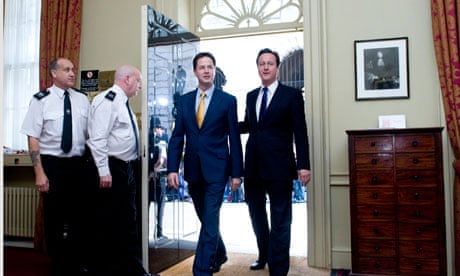Count on this: they mean it, they want it and they certainly intend to do it. David Cameron and Nick Clegg entered the Downing Street garden this afternoon to announce they were creating a government of breathtaking ambition.
It might have been born of an electoral accident – a hung parliament in which no single party could rule alone securely – but this union represents a fundamental coming together of ideas and values. It is not a marriage of convenience. Of course this afternoon's flirtatious press conference set a tone that cannot continue for long: two men separated only by the colour of the ties, walking hand in hand in a liberal wonderland. There will be rows and failures, but this is much more than a modern-day recreation of the infamous Fox-North coalition – a brief gathering of political enemies, which soon fell apart over the issue of electoral reform.
The unifying idea is liberal, but liberalism, like progress, is one of those things that almost everyone believes they stand for. In this incarnation, it implies a strong respect of the primacy of the individual over the state – a distrust of arbitrary authority and interference that is part of the Conservative philosophical inheritance.
Clegg and Cameron think alike: not on everything, and often not on specifics, but certainly on the direction in which they would like society and the state to develop. They do not think human progress is best achieved by the constant expansion of government expenditure. As Clegg has been heard to say, "the social democratic experiment has failed".
Yet, the programme they announced yesterday is not anti-government in every aspect – it is no carbon copy of transatlantic conservatism, and not pro-market Thatcherism either. On welfare, there is a pulling back from unaffordable universal provision – but a commitment to social support. On the environment, the state gains an expanded role. Two men, seemingly in love, and one piece of paper are a strange basis for a revolution. Sceptics will say it can't last. But then yesterday morning, the same sceptics were saying it would never even get going. They were wrong about that, and maybe they will be wrong about the transformative potential of this unique government, too.
